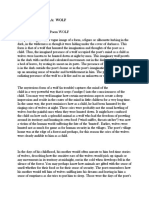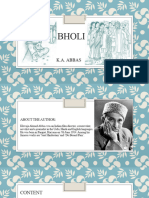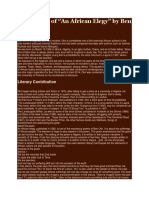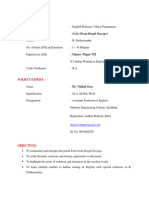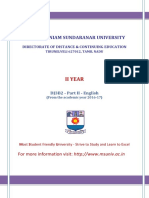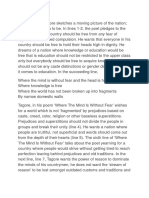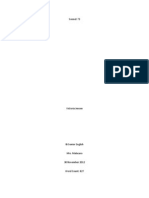On His Blindness
On His Blindness
Uploaded by
Star KingsCopyright:
Available Formats
On His Blindness
On His Blindness
Uploaded by
Star KingsOriginal Title
Copyright
Available Formats
Share this document
Did you find this document useful?
Is this content inappropriate?
Copyright:
Available Formats
On His Blindness
On His Blindness
Uploaded by
Star KingsCopyright:
Available Formats
On His Blindness
- John Milton
Introduction
It is one of the finest Sonnets of John Milton. It reflects the personal sorrow and
faith of the poet. In 1652, when blindness overtook him, he felt great pain due to it.
Thus, it is a moving and heart-rending personal sonnet. It presents his anguish at the
early blindness, his sense of mission in life and his unshakable faith in God and religion.
John Milton was the second great poet of England. He stands next only to
Shakespeare. He wrote many sublime and serious poems. He regarded the vocation of
the poet, lofty and exalted. Almost all his works, epics, sonnets or tragedies, reflect his
personal experiences of his life. This Sonnet has pleasing rhyme scheme. It is
composed in the ‘petrarchan’ form with two sections ‘octave’ and ‘sestet’. In ‘octave’ –
first 8 lines, the poet’s problem of loosing eye sight, pain and anger are presented, while
in sestet, the anger and complain are resolved. Here the poet leaves the sorrow and
accepts God’s will.
His Sorrow over Blindness
In the beginning, the poet complains that he has become blind before, “half of his
life has passed.” At such an early age of life, the blindness has made him bitter and
angry. He says painfully that ‘the world appears to him, dark and gloomy.’ He feels sad
when he thinks that his “one talent”- the gift of writing poetry is lying useless before
him. In this painful state, he cannot serve God by the use of his talent. Thus, the sonnet
opens with the complaint as his only talent is ‘lodg’d with’ him useless. In this state, he
asks himself…”whether God expects work from a Man who had lost eye-sight?” The
question shows the poet’s feelings of despair. He feels bad for his misfortune and
doubts about God’s ways to man.
His Unshakable Faith in God
In such moments of doubts, patience comes to console him. It consoles the poet
that God did not require the return of his gifts. God’s heart is kind and merciful. God has
no need of Man’s services. He has thousands of angles at ‘His command’ to render
their service to God. Those persons, who bear patiently the sufferings and sorrows of
life, could be good servants of Him. And those who pray silently and wait for His mercy
are also his real devotees. These feelings bring relief to his aggrieved heart. He calmly
resigns himself to the will of God. Now, he wishes to make the best use of the poetic
gift, by composing poems in praise of God.
Conclusion:
In the last lines, he asserts his ‘firm faith; in God and religion’. He consoles
himself with the thought that ‘they also serve God who ‘stand’ and wait’ and suffer
patiently. He thinks that man must submit himself completely to the ‘will of God’. The
best service to God is ‘to stand and wait.’ A true-devotee silently waits for his orders.
“Who best bear His mild yoke, They serve him best…” Thus, this Sonnet is moving and
heart-rending personal document. It brings us close to the mind, heart and religious
character of the blind poet. At the end, we find his unshakable faith in God and religion.
You might also like
- The Explanation of The Poem WolfDocument5 pagesThe Explanation of The Poem Wolfhemanta saikia100% (1)
- Masters English Language Project Topics and MaterialsDocument4 pagesMasters English Language Project Topics and MaterialsDANIEL CHUKWUDI100% (1)
- Three Types of Studies in The Eyes of Sir Francis BaconDocument7 pagesThree Types of Studies in The Eyes of Sir Francis BaconShahjahan KhanNo ratings yet
- Iambic Pentameter ActivityDocument1 pageIambic Pentameter ActivityPongNo ratings yet
- Conjugal Love Conjugal Love Refers To Love in A Conjugal Relationship, That Is, in A Marriage, Since The WordDocument4 pagesConjugal Love Conjugal Love Refers To Love in A Conjugal Relationship, That Is, in A Marriage, Since The WordAAQIBNo ratings yet
- Topic: Sir Philip Sidney: (An Apology For Poetry)Document9 pagesTopic: Sir Philip Sidney: (An Apology For Poetry)Shouban JatoiNo ratings yet
- Types of Poem: (Sonnet, Epic, Ode, Dramatic Monologue, Elegy)Document12 pagesTypes of Poem: (Sonnet, Epic, Ode, Dramatic Monologue, Elegy)Rakib HasanNo ratings yet
- Post-Colonial Poetry AnalysisDocument7 pagesPost-Colonial Poetry AnalysisKin Chan0% (2)
- Interpreting HomesDocument4 pagesInterpreting Homesindrani royNo ratings yet
- Significance of The Title of Arms and The Man by Bernard ShawDocument2 pagesSignificance of The Title of Arms and The Man by Bernard Shawgiridipak84No ratings yet
- Summary of 'Ash Wednesday': T.S. Eliot, in Full Thomas Stearns Eliot, (Born September 26Document7 pagesSummary of 'Ash Wednesday': T.S. Eliot, in Full Thomas Stearns Eliot, (Born September 26Ton TonNo ratings yet
- Thou Hast Made Me Endless:: Indian Writing in English Gitanjali-1Document21 pagesThou Hast Made Me Endless:: Indian Writing in English Gitanjali-1Sweety CatherineNo ratings yet
- Nagamandala QuestionsDocument2 pagesNagamandala QuestionsAlex Brunson100% (1)
- Dance Like A ManDocument2 pagesDance Like A ManNawami MukhiaNo ratings yet
- Subject: ENGLISH Class: B.A. Part 1 English Hons., Paper-1, Group B Topic: Precursors of Romantic Poetry Lecture No: 59 Prof. Sunita SinhaDocument6 pagesSubject: ENGLISH Class: B.A. Part 1 English Hons., Paper-1, Group B Topic: Precursors of Romantic Poetry Lecture No: 59 Prof. Sunita Sinhaishan sarkarNo ratings yet
- The Victorian Age in English Literature (1837-1901)Document20 pagesThe Victorian Age in English Literature (1837-1901)Sarah SunNo ratings yet
- Mock EpicDocument3 pagesMock EpicAnum Mubashar100% (2)
- Bholi: K.A. AbbasDocument15 pagesBholi: K.A. AbbasAdhyoth SrinivasNo ratings yet
- John Donne As A Metaphysical PoetDocument17 pagesJohn Donne As A Metaphysical PoetAngielyn Montibon Jesus100% (1)
- Cambridge Ladies EssayDocument4 pagesCambridge Ladies Essayapi-2635453380% (1)
- Reference (I) Poem: The Sick Rose (Ii) Poet: William Blake ContextDocument3 pagesReference (I) Poem: The Sick Rose (Ii) Poet: William Blake ContextAisha KhanNo ratings yet
- The PulleyDocument5 pagesThe Pulleypalmer okiemuteNo ratings yet
- A Critical Appreciation of Riders To The SeaDocument3 pagesA Critical Appreciation of Riders To The SeaItIs MyLife67% (3)
- Questions Answers From Dover Beach by Matthew ArnoldDocument8 pagesQuestions Answers From Dover Beach by Matthew Arnoldyuvika.shukla05No ratings yet
- Night of The ScorpionDocument5 pagesNight of The ScorpionGyandeepNo ratings yet
- Of Studies. TextDocument2 pagesOf Studies. TextAbdullah Al MashoodNo ratings yet
- An Analysis of An African ElegyDocument3 pagesAn Analysis of An African ElegyJohn IbrahimNo ratings yet
- Pope's Ode On SolitudeDocument2 pagesPope's Ode On SolitudeM.S.Subbulakshmi100% (1)
- Ode On SolitudeDocument3 pagesOde On SolitudeJeyarajanNo ratings yet
- Exile (From Rough Passage) by R200225111102022222Document19 pagesExile (From Rough Passage) by R200225111102022222Bishnoi KANHAIYANo ratings yet
- Literary Criticism I One Mark QuestionsDocument38 pagesLiterary Criticism I One Mark QuestionsmmdanwarNo ratings yet
- Horace and LonginusDocument25 pagesHorace and LonginusAnwar SahebNo ratings yet
- Manonmaniam Sundaranar University: Ii YearDocument54 pagesManonmaniam Sundaranar University: Ii YearKaruppannanmariappancollege KmcNo ratings yet
- Stopping by Woods On A Snowy Evening SymbolismDocument9 pagesStopping by Woods On A Snowy Evening SymbolismEdhoTrygvasen100% (1)
- Definition of LiteratureDocument5 pagesDefinition of LiteratureHenry BascuguinNo ratings yet
- CHAPTER 1 Summary Doc Arias Book Beginning TheoryDocument17 pagesCHAPTER 1 Summary Doc Arias Book Beginning TheoryRON COSEP100% (1)
- To India - My Native LandDocument2 pagesTo India - My Native LandChhagan Arora0% (2)
- Go and Catch A Falling StarDocument8 pagesGo and Catch A Falling Startusharrabby33100% (1)
- Anglo Saxon Lyrics and ElegiesDocument2 pagesAnglo Saxon Lyrics and Elegiessamir_baruah80% (5)
- The Dying EagleDocument16 pagesThe Dying EaglerincyNo ratings yet
- The PartingDocument3 pagesThe PartingThiru PathiNo ratings yet
- B.A. English 3rd Year 6Document11 pagesB.A. English 3rd Year 6AlishasebyNo ratings yet
- Taine's FormulaDocument1 pageTaine's Formulajunaid ashrafNo ratings yet
- Romantic To Victorian PeriodDocument122 pagesRomantic To Victorian Periodrajkumar0707engNo ratings yet
- Of Studies by Francis Bacon - The Theme and Style of The EssayDocument2 pagesOf Studies by Francis Bacon - The Theme and Style of The Essayfahim99100% (1)
- 08 - Chapter 2 PDFDocument72 pages08 - Chapter 2 PDFanon_59951004No ratings yet
- Veldiction Forbidding MourningDocument3 pagesVeldiction Forbidding MourningAliaNo ratings yet
- Summary For Where Mind Is Without FearDocument4 pagesSummary For Where Mind Is Without FearRachna Maheshwari100% (1)
- Symbols and Images in The Poetry of TagoreDocument5 pagesSymbols and Images in The Poetry of TagoreAdib Hassan100% (1)
- Dream ChildrenDocument2 pagesDream ChildrenP S Prasanth Neyyattinkara0% (1)
- Wordsworth's Attitude Towards Nature - Marie-RoseDocument3 pagesWordsworth's Attitude Towards Nature - Marie-RoseMaqsood Ahmed50% (2)
- Marginalisation of Indigent in CoolieDocument5 pagesMarginalisation of Indigent in CooliepriyankaNo ratings yet
- Bacon On Marriage & Single LifeDocument2 pagesBacon On Marriage & Single LifeLijimol GeorgeNo ratings yet
- Elements of Indian Ness in Jayanta MahapatraDocument9 pagesElements of Indian Ness in Jayanta MahapatraBhawesh Kumar Jha50% (2)
- Introducing Writers of Post Independence EraDocument6 pagesIntroducing Writers of Post Independence EraAkhtar AhsanNo ratings yet
- John DrydenDocument17 pagesJohn DrydenMai RajabarNo ratings yet
- Indian English Literature AssignmentDocument7 pagesIndian English Literature AssignmentChanpreet KaurNo ratings yet
- William Cowper's Depiction of God in The Poem "Light Shining Out of Darkness"Document12 pagesWilliam Cowper's Depiction of God in The Poem "Light Shining Out of Darkness"alyarahmaputri100% (1)
- Dryden As The Father of English Criticism PDFDocument6 pagesDryden As The Father of English Criticism PDFAmeen AmeenNo ratings yet
- Critical Appreciation of ON HIS BLINDNESSDocument2 pagesCritical Appreciation of ON HIS BLINDNESSanujsaxena965No ratings yet
- Formalism ApproachDocument3 pagesFormalism ApproachNAYVE, Alyssa Jane C.No ratings yet
- BlindnessDocument2 pagesBlindnessDharmendra KhatriNo ratings yet
- CW 1ST Periodical TestDocument2 pagesCW 1ST Periodical TestRowena Nunez100% (1)
- The Wonder That Was India: A.L. BashamDocument10 pagesThe Wonder That Was India: A.L. BashamBittubossNo ratings yet
- Poetry Analysis: Using The TP-CASTT MethodDocument34 pagesPoetry Analysis: Using The TP-CASTT MethodJunaid Hussain100% (1)
- Poetry EssayDocument4 pagesPoetry Essayapi-341086001No ratings yet
- Sonnets of ShakespeareDocument33 pagesSonnets of ShakespeareSaqlain Abbas100% (2)
- Prayer Answer and Mind MapDocument4 pagesPrayer Answer and Mind MapSarthak JainNo ratings yet
- Characteristics SonnetDocument2 pagesCharacteristics Sonnetapi-260339450No ratings yet
- Selected Poems For StudyDocument50 pagesSelected Poems For StudysamaaliNo ratings yet
- Slides On Types of Poems and Poetic DevicesDocument19 pagesSlides On Types of Poems and Poetic DevicesIbrahim AbuNo ratings yet
- Sonnet 116 & Sonnet 29: By: William ShakespeareDocument24 pagesSonnet 116 & Sonnet 29: By: William ShakespeareMicah ElaineNo ratings yet
- Poetry and Its Kinds: Dr. Shahzad Ul Hassan FarooqiDocument18 pagesPoetry and Its Kinds: Dr. Shahzad Ul Hassan FarooqiAmjad MohammadNo ratings yet
- Poem 30 TypesDocument7 pagesPoem 30 Typesapi-242974548No ratings yet
- Environment in Literature by Nasim AhmadDocument55 pagesEnvironment in Literature by Nasim AhmadNasim AhmadNo ratings yet
- CinquainDocument3 pagesCinquainJumarie BalinsagarNo ratings yet
- Poetry ResourceDocument40 pagesPoetry ResourceM MNo ratings yet
- Ozymandias ParagraphDocument1 pageOzymandias Paragraphapi-320780462No ratings yet
- StylisticsDocument2 pagesStylisticsMissy HendrixNo ratings yet
- Poetry PPT Sir EaDocument52 pagesPoetry PPT Sir EaCHRISTIAN EANo ratings yet
- English ModuleDocument19 pagesEnglish Modulerozzeille jyne geraldez86% (7)
- The Conception of Time in Shakespeares SonnetsDocument18 pagesThe Conception of Time in Shakespeares SonnetsAyan GhoshNo ratings yet
- Poetic DevicesDocument8 pagesPoetic Devicesapi-53798025No ratings yet
- Sonnet of SonnetnessDocument2 pagesSonnet of Sonnetnessapi-282403038No ratings yet
- Sonnet 75Document2 pagesSonnet 75Jay Bepari100% (1)
- Sonnet 73Document4 pagesSonnet 73Bookfanatic13No ratings yet
- Sonnet 97 by ShakespeareDocument2 pagesSonnet 97 by ShakespeareGeaninaLucianaNo ratings yet
- A Persian Listening Lesson About Rudaki and Ferdowsi - Adapted From Persian Listening Chapter 7 (2009)Document19 pagesA Persian Listening Lesson About Rudaki and Ferdowsi - Adapted From Persian Listening Chapter 7 (2009)HoomanNo ratings yet
- Analysis of The Poem THE SUN RISING by John DonneDocument3 pagesAnalysis of The Poem THE SUN RISING by John DonneAnaNo ratings yet
